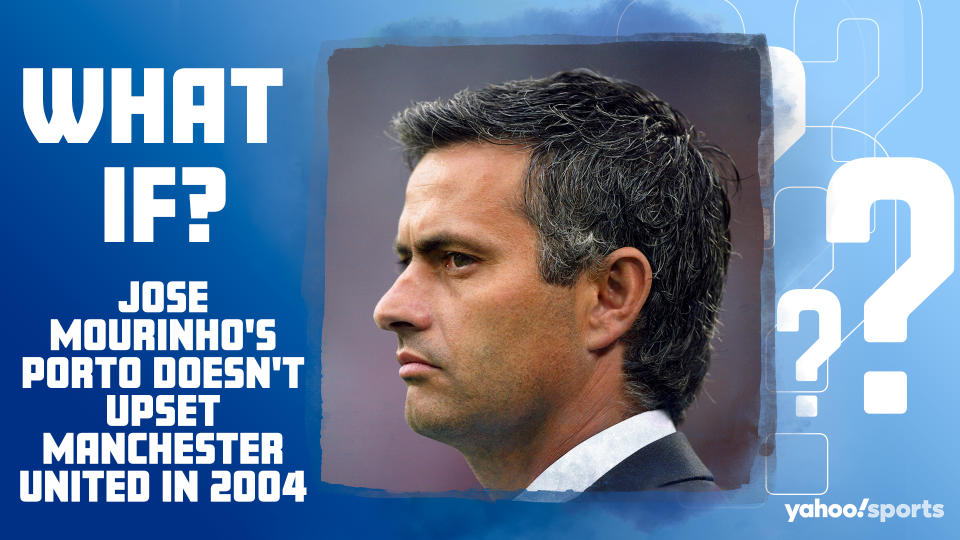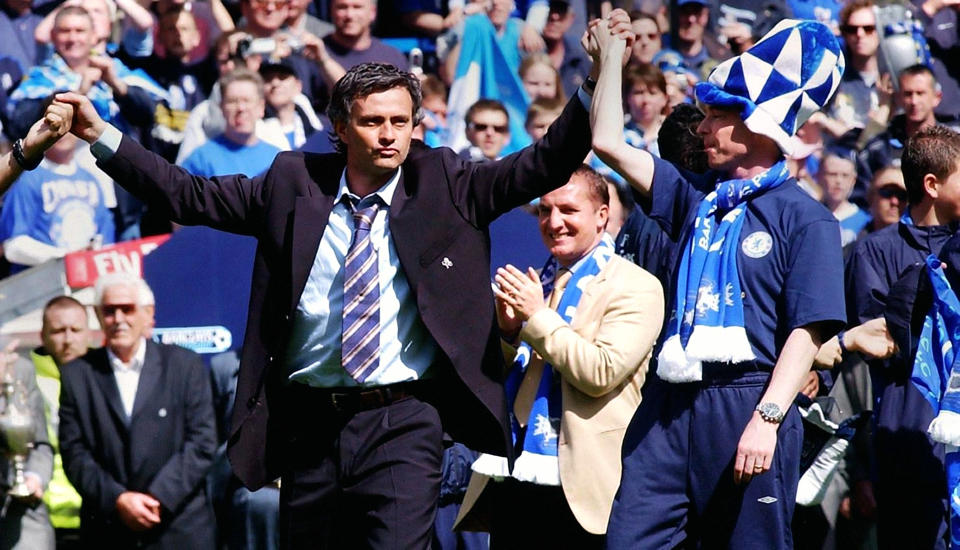What if Jose Mourinho's Porto loses to Manchester United in the Champions League in 2004?

With a loving nod to Marvel Comics, we at Yahoo Soccer decided to ask, “What If?”
In this issue: What if Jose Mourinho’s Porto had lost to Manchester United in the Champions League in 2004?
While the second leg would make Jose Mourinho famous, it was the first leg of the 2003-04 UEFA Champions League round of 16 bout between his FC Porto and Manchester United that would make him, well, Jose Mourinho.
Late in Porto’s 2-1 home win on two goals from Benni McCarthy, overcoming Quinton Fortune’s early tally for United, Roy Keane stamped on Vitor Baia’s foot and got sent off. Legendary United manager Sir Alex Ferguson thought the goalkeeper had played up the incident to get the Red Devil captain red carded, and bellowed as much to Mourinho.
“I understand why he is a bit emotional,” Mourinho, unknown and unimpressed, said after the game in the deadpan snark that would become his calling card. “You would be sad if your team gets as clearly dominated by opponents who have built on 10 percent the budget. … He has some top players in the world and he should be doing a lot better than that.”
In the second leg at Old Trafford, Paul Scholes’s 32nd-minute goal looked all set to send United through to the quarterfinals until Costinha scored in the 90th minute to pull off a momentous upset. As the ball hit the net, Mourinho set off toward his celebrating players, punching the air, and joined them in the celebration in a heretofore unseen outpouring of managerial joy. That’s when a lot of people noticed him for the first time.
Porto went on to beat Lyon, Deportivo La Coruña and Monaco to crown themselves champions of Europe and won the Portuguese league for a second season in a row. And after flirting with Liverpool, which hired Rafa Benitez instead, Mourinho joined newly moneyed Chelsea and Roman Abramovich’s ambitious project.
Mourinho had to go back on his own words though.

“Liverpool are a team that interests everyone, and Chelsea does not interest me so much because it is a new project with lots of money invested in it,” Mourinho had said a month and a half before signing on with the Blues. “I think it is a project which, if the club fail to win everything, then Abramovich could retire and take the money out of the club. It's an uncertain project. It is interesting for a coach to have the money to hire quality players but you never know if a project like this will bring success.”
The rest is history all the same. Mourinho took defenders Ricardo Carvalho and Paulo Ferreira with him from Porto and went on a spending spree for Didier Drogba, Michael Essien and others. Then he spoke those immortal words: “Please don’t call me arrogant, but I’m European champion and I think I’m a special one.”
Mourinho, of course, summarily won Chelsea its first league title in half a century. He would win two more Premier Leagues with Chelsea, a treble with Inter Milan, a La Liga title with Real Madrid and the Europa League with Manchester United. On the whole, he’s won 25 major prizes and was named the FIFA World Coach of the Year in 2010.
But what if Porto hadn’t upset United that year? What if it hadn’t launched Mourinho as the hottest young manager around, sending him on his way to one of the most decorated careers in coaching?
Mourinho may not have been offered a big job and stayed on with Porto instead. But rising stars like Carvalho, Ferreira and Deco, who went to Barcelona, would probably still have left. Certainly, Porto did a lot of good business on the transfer market that summer, buying Pepe, Thiago Silva, Helder Postiga, Diego, Ricardo Quaresma, Raul Meireles and Paolo Assuncao, among others, for much less than they would soon be worth. But it would have taken several years for that squad to mature into another Champions League contender, and Mourinho’s shot at the big-time might have been delayed along with it.
The ramifications for his would-be clubs might be more dramatic still.
Mourinho brought immediate success to Chelsea, propelling the club to the top of the European hierarchy far quicker than anybody had imagined – building the core of the squad that would win the Champions League in 2012. The suddenness of that domestic silverware was crucial in overtaking Arsenal and Liverpool in the English soccer firmament. And it’s entirely feasible that Abramovich and his quick managerial trigger might have jumped from one man to the next, creating an expensive chaos, in the absence of the stability Mourinho brought.
It’s unlikely that Inter Milan would have done as well without Mourinho’s man management and defensive tactical nous. Because in the middle of his two seasons there, his squad underwent a major overhaul, losing Zlatan Ibrahimovic to Barca. Nonetheless, Mourinho coaxed a treble out of a veteran side.
And in his next job, with Real Madrid, he provided a counterweight to Pep Guardiola’s dominant Barca side with a savvy, counter-attacking team. What’s more, he helped the club break through a European run of futility – six consecutive round of 16 eliminations – with three straight semifinal places. Here, too, he laid the foundation for the four Champions League titles the club would win in the five years after he left.
In an alternate, Mourinho-less universe where Porto doesn’t score that 90th-minute goal to eliminate United in 2004, it’s hard to say if Chelsea, Inter or Real fare quite so well. Or if Mourinho himself becomes the colossal figure that he does.
But it did. And they did. And he did.
Leander Schaerlaeckens is a Yahoo Sports soccer columnist and a sports communication lecturer at Marist College. Follow him on Twitter @LeanderAlphabet.
More ‘What If?’ from Yahoo Soccer:

 Yahoo Sports
Yahoo Sports 
